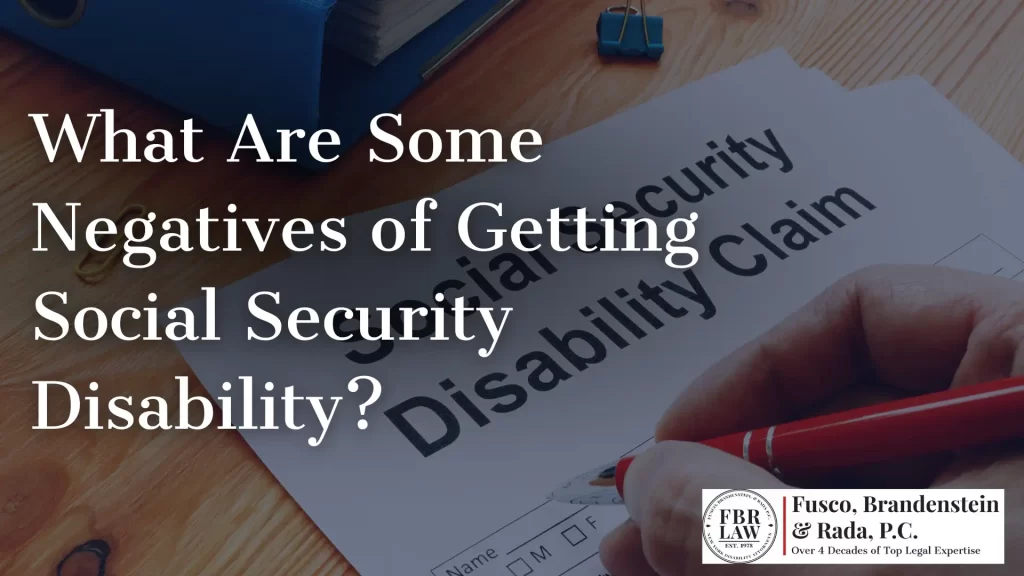
When facing a disability that prevents you from working, Social Security Disability Insurance (SSDI) can provide a much-needed financial lifeline. However, as with any government program, there are some potential drawbacks to receiving SSDI benefits.
Limited Income
One of the primary disadvantages of Social Security disability is the limited income it provides. SSDI benefits are calculated based on your average lifetime earnings before your disability began, and the amount you receive may be significantly lower than your previous income. In 2024, the average monthly SSDI benefit in New York is $1,540, which may not be enough to cover all your living expenses, especially if you have high medical costs related to your disability.
Additionally, SSDI benefits are subject to a maximum monthly amount, which is $3,822 in 2024. Even if your pre-disability income exceeds this amount, you won’t receive more than the maximum benefit. This can be particularly challenging if you live in an area with a high cost of living or have significant financial obligations.
Waiting Period
Another negative aspect of getting Social Security disability is the waiting period before benefits begin. When you apply for SSDI, there is a five-month waiting period from the onset of your disability until you can receive benefits. During this time, you may have to rely on savings, family support, or other forms of assistance to make ends meet.
Furthermore, the application process for SSDI can be lengthy, often taking several months or even years to receive a decision. If they deny your initial application, you may need to go through an appeals process, extending the waiting period even longer. This delay in receiving benefits can cause significant financial strain and emotional stress for you and your family.
Eligibility Requirements
To qualify for SSDI, you must meet strict eligibility requirements. You must expect your disability to last for at least one year or result in death, and it must prevent you from engaging in substantial gainful activity (SGA). In 2024, the SGA limit is $1,550 per month for non-blind individuals and $2,590 for blind individuals.
Meeting these requirements can be challenging, especially if your disability is not easily quantifiable or if you have a condition that doesn’t fit neatly into the Social Security Administration’s (SSA) definition of disability.
Limited Work Opportunities
One of the cons of being on disability is the potential impact on your future work opportunities. While SSDI allows for a trial work period and offers work incentives to help you transition back to employment, many beneficiaries find it difficult to return to the workforce after an extended period of benefits.
Employers may be hesitant to hire someone with a disability, especially if they have been out of work for a significant amount of time. Additionally, if you return to work and earn above the SGA limit, you risk losing your SSDI benefits entirely. This can create a disincentive to seek employment, as you may fear losing the financial stability that SSDI provides.
Stigma and Social Isolation
Unfortunately, there is still a stigma associated with receiving disability benefits. Some people may view SSDI beneficiaries as “lazy” or “undeserving,” without understanding the significant challenges that come with living with a disability. This stigma can lead to feelings of shame, guilt, and social isolation.
Moreover, the limitations imposed by your disability and the financial constraints of living on SSDI can make it difficult to maintain social connections and engage in activities you once enjoyed. This isolation can take a toll on your mental health and overall well-being, further compounding the challenges of living with a disability.
Seeking Help and Support
While the negatives of getting Social Security disability can seem daunting, it’s important to remember that SSDI benefits can also provide a vital source of financial support and stability during a difficult time. If you’re considering applying for SSDI or have been denied benefits, it’s essential to seek help and support from qualified professionals who understand the system and can guide you through the process.
The compassionate disability attorneys at Fusco, Brandenstein & Rada, P.C. have over 40 years of experience helping people with disabilities in New York navigate the SSDI application and appeals process. They understand the unique challenges you face and dedicate themselves to providing the knowledgeable legal guidance you need. If you have questions about the disadvantages of Social Security disability or need assistance with your claim, contact Fusco, Brandenstein & Rada, P.C. today at 516-496-0400 for a free consultation. They’re here to help you understand your options and fight for the benefits you deserve.
